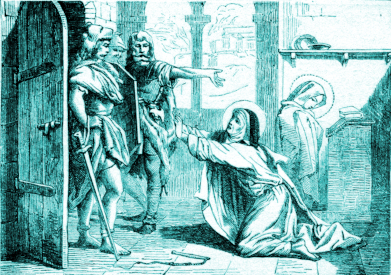Lives of the Saints
Our Models and Protectors
Spiritual Bouquet:
January 31

Saint Marcella
Widow
(† 410)
Marcella, a young widow, whose name alone is enough to recall the best days of the Roman republic, and whose rare beauty, enhanced by the long and illustrious line of her ancestors, drew around her numerous suitors, rejected the suit of Cerealtis, the consul, and resolved to imitate the lives of the ascetics of the East.
Afterwards, when Saint Jerome came to Rome to renew the instructions and narratives of those holy men by adding to them the living commentary of his own life, Marcella, with her mother Albinia, and her sister Asella, placed herself at the head of that select number of illustrious matrons who took him as their guide and oracle. She astonished the holy doctor by her knowledge of the Divine Scriptures, she fatigued him by her thirst always to know more of them than he could teach her; she made him afraid to find in her a judge rather than a disciple.
In her palace on Mount Aventine, she collected, under the presidency of Jerome, the most pious among the noble ladies, for mutual strength and enlightenment. After having thus first given to Rome the true model of a Christian widow, she passed the last thirty years of her life in her suburban villa transformed into a monastery.
The Goths under Alaric plundered Rome in 410. Saint Marcella was scourged by them to deliver up her treasures, which however she had long before distributed among the poor. All the while she was in anguish of soul for her dear spiritual child Principia, and falling at the feet of the cruel soldiers, she tearfully implored them to spare her insult. They conducted them both to the Church of St. Paul, to which Alaric had granted the right of sanctuary, and suffered the beautiful young nun Principia to remain unmolested.
Saint Marcella did not survive this long, but died peacefully in the arms of Principia, about the end of August, 410, but her name occurs in the Roman Martyrology on Januaru 31st.
Rev. Sabine Baring-Gould, The Lives of the Saints, Vol. 1, (John C. Nimmo, London, 1897.